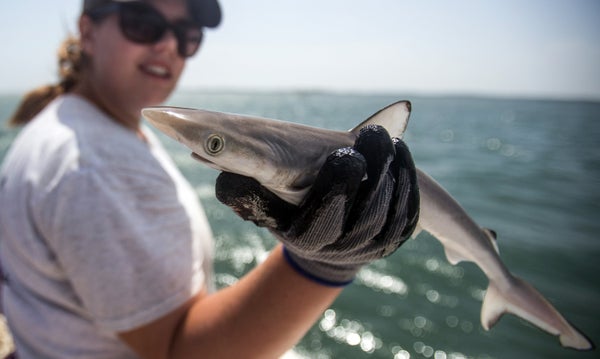Sharks in Brazil Test Positive for a Surprising Contaminant: Cocaine
Cocaine has been detected in sharks for the first time, but scientists aren’t sure of the impact
Researchers found cocaine in sharpnose sharks off Brazil. These sharks are in the same genus as the Atlantic sharpnose shark, shown here with a student researcher near Cape Lookout in the Outer Banks of North Carolina.
Tegan Johnston/Raleigh News & Observer/Tribune News Service via Getty Images
Sharks swimming off the cost of Brazil have something a little startling coursing through their systems: cocaine.
The drug had never previously been found in wild sharks. But that doesn’t mean these fish are unique; scientists just hadn’t previously tested any shark for coke. The effort was a slam dunk, with the 13 sharks that were examined all testing positive for the drug in their muscles and liver, according to a new study in Science of the Total Environment.
What this means for the sharks is an open question, say the study co-authors Enrico Mendes Saggioro and Rachel Ann Hauser-Davis, an ecotoxicologist and a biologist, respectively, at Brazil’s Oswaldo Cruz Foundation. No one has ever studied the behavioral or physiological impacts of cocaine in sharks, Hauser-Davis says, but her ongoing research on environmental contamination in these apex predators suggests the notorious drug is only one of the animals’ worries.
On supporting science journalism
If you’re enjoying this article, consider supporting our award-winning journalism by subscribing. By purchasing a subscription you are helping to ensure the future of impactful stories about the discoveries and ideas shaping our world today.
“We detected high levels of metals and also detected ‘forever chemicals’ [perfluoroalkyl and polyfluoroalkyl substances, or PFASs], pesticides and polycyclic aromatic hydrocarbons, PCBs and PBDEs in over 30 shark and ray species,” Hauser-Davis says. PCBs, or polychlorinated biphenyls, are carcinogenic chemicals banned by the U.S. in 1976 and by signatories of the United Nations’ Stockholm Convention in 2001. PBDEs, or polybrominated diphenyl ethers, are flame retardants that can disrupt brain development and hormones.
The researchers became interested in drug testing sharks after Mendes Saggioro detected cocaine while researching river water contaminants in Brazil’s state of Rio de Janeiro. Brazil has an estimated 1.5 million cocaine users, according to the World Drug Report 2020 And…
Click Here to Read the Full Original Article at Scientific American Content: Global…

